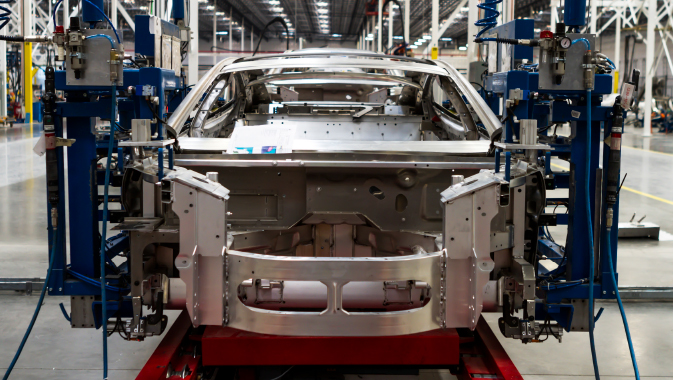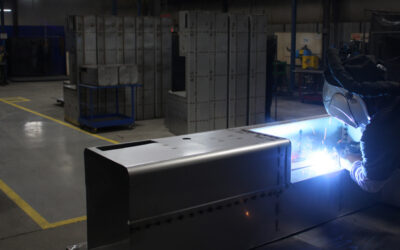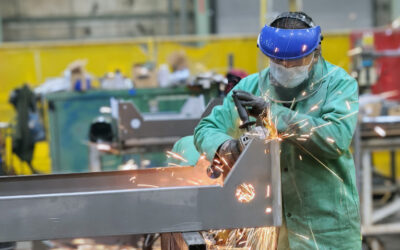Design Systems, Inc. (DSI) brings enormous experience to its mission of providing manufacturing, engineering, and consulting services for industrial operations. The focus is strictly on conceiving, implementing, and optimizing the design and engineering processes of manufacturing.
“If you manufacture something, from potato chips to tank engines, it doesn’t really matter to us what it is because there’s a manufacturing process that has to take place. From the raw materials to the finished goods and out the door, we focus on the manufacturing process,” explains Paul Munzenberger, Sales Manager at DSI. With many of the company’s clients in the parcel and package industry and thus focused on processing rather than manufacturing, DSI can also help these clients to improve the efficiency of their processing and distribution.
DSI delivers every service needed in executing projects for its clients including concept engineering, written specifications for bidding contracted work, and detailed designs and drawings. Very often DSI will transition to a project management role. Once the contracts are established and equipment providers are chosen, DSI manages the fabrication, the installation, and the commissioning of the equipment and production line setup. “We support our clients from concept through commission. If they want more throughput or if they are having quality issues, we will do it all,” Paul says.
A strong team
The five founding partners of DSI were automotive engineers and in 1983 they identified an opportunity to establish an as-needed technical engineering resource for project execution.
Large manufacturing companies at one time had full-time employees specifically dedicated to execute these projects, but invariably they were not fully utilized in the downtime between projects. This inefficient business model inspired DSI to become an on-call technical engineering resource for a variety of industrial clients. “We come in and we execute programs, sometimes weeks long, sometimes years long, and then when the project is done we go away and we’re not on the corporate headcount,” explains Paul. Two of the original founding partners are still engaged in daily business at DSI.
DSI’s three locations – in Farmington Hills, Michigan, Windsor, Ontario, and Saltillo, Mexico – have a total staff of around 300, many of whom have been at the company for 20 to 30 years. The experienced team members blend well with the young, up and coming engineers.
The company’s training program is very specifically adapted to DSI’s own needs, because its typical day-to-day engineering challenges are not covered at most engineering schools. Students may receive degrees in mechanical engineering, however, there is no degree in conveyor engineering, which is a large part of the work at DSI. The company partners with Kettering University in Flint, Michigan, to help prepare young recruits for these specialized challenges.
Kettering University has a program that allows students to take a three month course in the classroom and then transition to a three month work term. DSI formally interviews these students and once hired, they receive hands-on experience under supervision, which helps to integrate them into the company. Many are hired full time at the end of their four or five year University term and they become highly skilled and extremely valuable engineers.
When recruiting, DSI looks for people who are willing to work hard, are eager to learn, ask a lot of questions, and are enthusiastic about diving into a new project. As always the young bring a new energy and a stream of fresh ideas to the workplace.
Continuous improvement
DSI is a relatively flat organization with few levels of management. As a consequence the environment is transparent and top management is very receptive to new ideas, new markets, and new services. DSI is continually evaluating and improving the latest tools, software, and techniques to ensure it is at the forefront of service and capabilities. A few years ago it developed its own training system called Design Systems, Inc. University (DSIU) both for its own employees and as a service offering to its clients.
In the past, growth of the business was primarily in the automotive industry sector, but recently the parcel / package and supply chain industry has become more active as a result of the e-commerce boom. Many of DSI’s clients are in the process of improving warehouse operations to better serve their own customers and remain competitive. “We are growing into new markets like the warehousing side of life, industry 4.0, and the whole digitalization of all these factories,” says Paul. “We pick our spots and we focus on value for the clients.”
The pace of innovation is radically different for each client; while some completely embrace modernization and strive to be on the cutting edge, others want to expand at a slower and more controlled rate. DSI manages all of its clients individually with customized services and keeps up with all industry advances to guarantee its first-rate services as it adapts to the clients’ needs.
Growing with its clients
“We make it a point to continuously invite equipment suppliers and technology suppliers in to see us, hold lunch-and-learns, and educate our staff about the latest technologies in the marketplace because our clients expect us to know best-in-class practices,” says Paul.
With its clients’ best interests in mind, DSI fully engages with the client’s organization from the plant-floor operators all the way up to the CEO. When it comes to growth in the industry 4.0 space, DSI works with its clients and their staff to create a road map specific to their current and future organizational needs. The overall objective, which can involve a long process, is usually divided into smaller segments to be achieved one step at a time.
One of these processes can be the digital transformation of the plant floor, which involves the creation of a digital twin to the facility by capturing a high-definition 3D model of the plant that is fully interactive. It is a fantastic collaboration tool for meetings and projects and a necessary aspect of the transformation process to a smart factory. Laser scanning and 3D design is one of the fastest growing of the services available at DSI. The process is similar to using Google Street View as you can walk freely around the plant to explore the facility.
Design Systems, Inc. has three employees now who have achieved drone pilot certification under the FAA’s Small UAS Rule. The certification process is not easy but it ensures that the drone pilot has thoroughly mastered all the complexities, safety regulations, and skills.
The total package
DSI faces a significant amount of competition. However, most companies tend to compete with only one segment of DSI’s services, such as its material handling team or its electrical team. That’s why the wide range of its comprehensive engineering skill sets and core strategic services are great assets for its clients. “What makes us stand out from the crowd is our full-service engineering capability where we’re able to staff these projects with the appropriate team to execute the whole project. From mechanical and electrical skills to industrial engineering and paint process design, we have it all under one roof, so as issues arise on a project, we’re able to immediately pull in additional resources and have no delays at the job,” says Paul.
Lean manufacturing and sustainability are the foundation of DSI. It is able to serve its clients by managing a variety of improvement and transitional projects including the process of consolidating two facilities into one; resolving a bottleneck issue when the desired throughput is not reached; the introduction of a new production line into an existing system; and greenfield projects. (“Greenfield” projects borrow their name from the occasions when brand-new buildings are developed from the ground up and where there is no need to demolish, repair, or take into account any existing infrastructure.)
DSI can help these industrial projects by designing their manufacturing processes and securing their efficiency from the very start.
August 2019 marks the 36th anniversary of DSI. Plans for the future are to consolidate and strengthen the company’s position as a leading provider of manufacturing engineering and consulting services. With its accumulated experience and knowledge, and by the application of both well-tested methods and the newest technologies, DSI leads its clients through even the most challenging industrial transitions.
“We have an 85 percent customer-return rate which is very high for our industry. Our clients regularly come back to us over and over again when they execute projects,” says Paul. “We send out customer satisfaction surveys and 95 percent gave us top marks on ‘satisfaction with our services’.”













